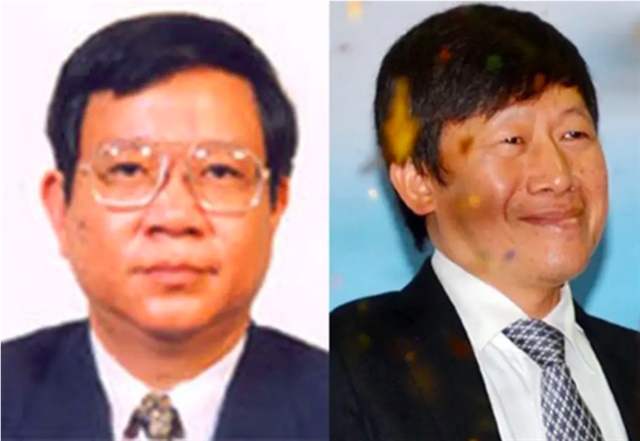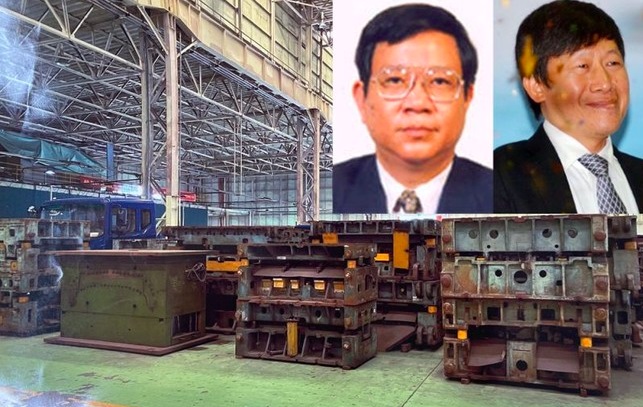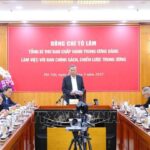## Former VEAM General Director Sentenced to 11 Years in Prison for Causing Nearly VND 27 Billion in Losses
On March 6, the Hanoi People’s Court opened a first-instance trial and sentenced defendant Nguyen Thanh Giang, former General Director of the Corporation for the Manufacture of Automotive Engines and Agricultural Machinery of Vietnam (VEAM), to 11 years in prison for “Violation of regulations on the management and use of state assets, causing waste and loss” according to the provisions of Article 219 of the Criminal Code.
For the same offense, the Court also sentenced defendant Ho Manh Tuan, former Deputy General Director of VEAM, to 7 years in prison.

Defendants Nguyen Thanh Giang and Ho Manh Tuan. |
According to the indictment, the VEAM Automobile Factory (headquartered in Thanh Hoa province) is a member branch that is dependent on VEAM for accounting and operates under its authorization.
The prosecution argued that in 2005 and 2011, VEAM purchased 305 sets of automotive cabin die-casting molds but did not use them for anything. This was considered a violation of the law, causing a loss of nearly VND 27 billion.
According to the prosecution, on April 5, 2005, VEAM, represented by defendant Giang (General Director at that time), signed an economic contract (without a number) to purchase 101 sets of old, used automotive cabin metal molds from P&H Incorporation, South Korea, for USD 395,000.
On April 18, 2005, defendant Tuan, who was then Head of Technical Investment, signed a payment request for the purchase of automotive cabin molds, which was approved by defendant Giang for payment of more than VND 6.2 billion (equivalent to USD 395,000).
On January 18, 2011, defendant Giang sent a document requesting advice from the VEAM Members’ Council on the purchase of a number of automotive cabin molds and interior plastic molds from Samsung.
Nearly a month later, the Business Market Department submitted a report proposing the SV110 cabin model and requesting VEAM to consider investing in the purchase. On March 15, 2011, the VEAM Investment Technical Department submitted a report signed by defendant Tuan and approved by defendant Giang for the purchase of automotive cabin molds and interior plastic molds from Samsung.
On March 18, 2011, VEAM and Veam Korea Joint Venture Company signed two contracts to purchase 204 sets of old, used metal molds for more than VND 13 billion.

Hundreds of automotive cabin molds were purchased but left unused for years, causing state losses (large image) and the two defendants, Giang and Tuan.
|
According to the prosecution, after purchasing the 305 sets of automotive cabin molds, from 2011 to 2012, VEAM decided to establish a research group to promote the automotive cabin production project. However, from that time until now, VEAM has not produced any SV110 cabins for assembly and sale on the market.
In 2019, the Inspection Department of the Ministry of Industry and Trade issued an inspection conclusion stating that the cabin mold system caused damage of nearly VND 27 billion.
According to the 2021 judicial expertise conclusion of the Ministry of Industry and Trade, the purchase of the 101 sets of molds in 2005 was not in accordance with the proper procedures and did not comply with the provisions of the law. This purchase was not included in the annual business plan, investment plan, or resolutions approved by the Board of Directors. The mold sets were left to rust and became unusable from the time of purchase in 2005 until now.
Similarly, the purchase of the 204 sets of molds in 2011 was also deemed improper and non-compliant with legal regulations.
During the investigation, defendants Giang and Tuan confessed that they did not gain any personal benefits from these contracts.
Hoang An
– 19:01 06/03/2025
“Legal Framework for Digital Currency: Safeguarding National Interests and Security.”
The regulatory framework for digital currencies needs to be developed to keep pace with the global digital economy, while also ensuring monetary policy stability and the integrity of national finances.
The Prime Minister: Proactive and Agile in the Face of Global Economic Flux
As economic and trade policies evolve globally, the Prime Minister has urged for a proactive and agile approach. We must closely monitor these dynamic policy changes and respond with flexibility and feasibility for each market. To thrive in this evolving landscape, we should focus on fostering stronger partnerships with key players, reviewing tax policies, and strategically investing in high-tech sectors and innovation.
The Power of Property: Unlocking Vital Energy Through Architecture and Landscape Design
The latest real estate offering is an exquisite curation of suburban living trends, designed to create an architectural and landscape masterpiece that inspires a positive and vibrant lifestyle for its residents.





















